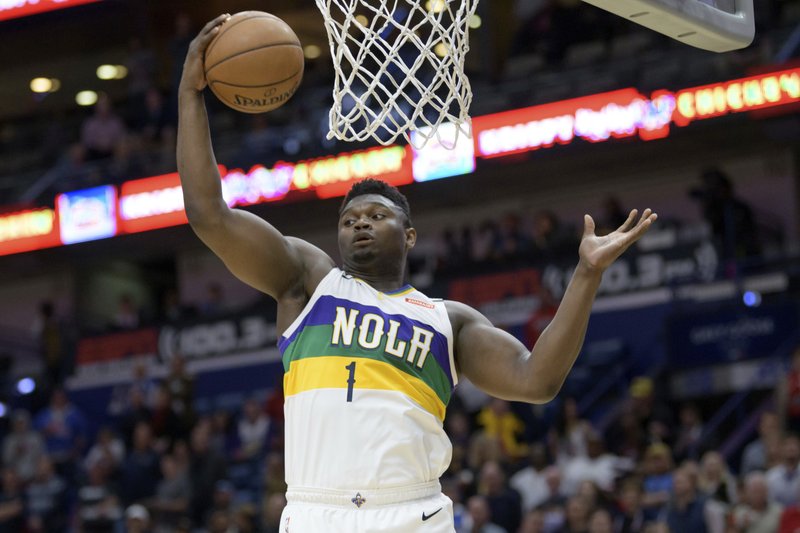
FILE – In this Feb. 13, 2020, file photo, New Orleans Pelicans forward Zion Williamson grabs a rebound during the first half of an NBA basketball game against the Oklahoma City Thunder in New Orleans. The marketing agent who has sued NBA rookie Williamson wants the former Duke star to answer questions about whether he received improper benefits before playing his lone season with the Blue Devils. (AP Photo/Matthew Hinton, File)
Lawyers for New Orleans Pelicans rookie Zion Williamson asked a federal judge in North Carolina on Friday to disregard an affidavit alleging a $400,000 payment was made to Williamson’s family before the former Duke star began his lone college season.
The new filing by attorney Jeffrey Klein reiterates his earlier public assertion that the claims made in the sworn affidavit were false and that evidence meant to support those claims, such as a purported Williamson driver’s license, were fraudulent.
The affidavit was provided to the court in Winston-Salem, North Carolina, by lawyers for ex-Williamson marketing agent Gina Ford, who is seeking $100 million in damages from the basketball star for breach of contract.
Klein said Ford’s lawyers have sought to file an “improper, legally irrelevant, and patently false set of papers … aimed at sullying the character of Mr. Williamson.”
Ford, the president of Prime Sports Marketing, filed a lawsuit last summer in a Florida state court accusing Williamson and the agency now representing him of breach of contract. That came a week after Williamson filed his own lawsuit in a North Carolina federal court to terminate a five-year contract with Prime Sports after moving to Creative Artists Agency LLC.
Earlier this month, Ford’s attorneys included a sworn affidavit from Donald Kreiss, a self-described entrepreneur from California, who said the head of a Canadian-based firm called Maximum Management Group (MMG) told him he paid Williamson’s family for his commitment to sign with MMG once he left Duke for the NBA.
The documents include a signed marketing agreement between Williamson and MMG from May 2019; a December 2019 “letter of declaration” supposedly signed by Williamson and his stepfather agreeing to pay $500,000 to MMG president Slavko Duric for “repayment of a loan” from October 2018; and a copy of Williamson’s South Carolina driver’s license — which listed Williamson’s height as “284” and his weight as “6′06.”
Klein noted that the Williamson signature on the MMG agreement differs from the signature Williamson provided to Ford when he initially signed with her.
Klein asserted that Ford’s attorneys “possessed information sufficient to confirm that the documents attached to the Kreiss affidavit were fraudulent. A cursory comparison of that information readily evidences that the documents are forgeries.”
Kreiss has since told Sports Illustrated he’d been defrauded and never had contact with Williamson or his family.
Ford’s attorneys have focused their case on a contention that Williamson had violated his college eligibility, and by extension, relinquished his amateur states, before he signed his initial marketing agreement with Ford.
Williamson’s lawsuit to terminate his agreement with Ford stated that Prime Sports violated North Carolina’s sports agent law, both by failing to include disclaimers about the loss of eligibility when signing the contract and the fact neither Prime Sports nor Ford were registered with the state.
Ford’s attorneys have argued the Uniform Athlete Agents Act wouldn’t apply if Williamson was ineligible to play college basketball from the start.
To bolster that argument, Ford’s attorneys also have sought to have last summer’s No. 1 overall NBA draft pick answer questions in Florida state court about whether he received improper benefits before playing for the Blue Devils. They had also raised questions about housing for Williamson’s family during his Duke career in a separate filing in North Carolina.
A Florida appeals court last month granted a stay to pause the proceedings there, shifting the focus to the North Carolina case.
Duke has repeatedly declined to comment on the case because it isn’t involved in the litigation, but issued a statement in January that school had reviewed Williamson’s eligibility previously and found no concerns.